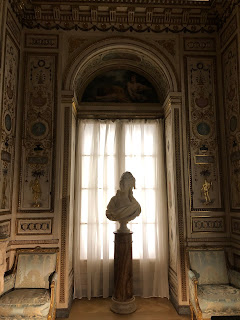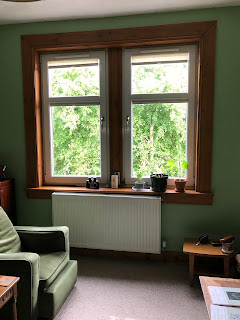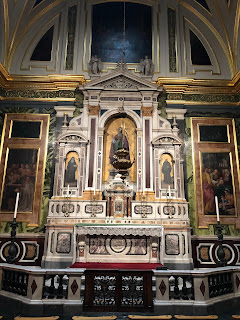On Friday Benedict Ambrose and I took the 17:30 train to London, arriving shortly after 22:00. Our journey was uneventful save for an argument directly behind us between a man in mask and a man not wearing a mask. This happened shortly before they got off at York, and there was a goodly amount of effing and blinding, or effing, certainly. The man not wearing a mask said that he had recently recovered from the virus and therefore was immune and unable to spread the virus, and the man who objected said he didn't care what he had had, which struck me as illogical.
Whereas 4.5 hours in a train is nothing in Canada, it is something in the UK, and I was very glad to reach our hotel in South Kensington and have a bath in our large, inviting bathroom. We opted to get there via the Tube as it is fastest and least complicated, if the more expensive, of the public transport options. Happily, you can now travel about London on your contactless debit card, just as you can in Edinburgh, so one more complication of life has been ironed out.
The next morning we consulted the internet and went to La Brioche on the Old Brompton Road for an economic and delicious breakfast. Then we walked about South Ken a bit, admiring the silent Daquise Polish restaurant (begun in 1947) and the amazing shop window of the Medici Gallery card shop, full of Advent calendars. Naturally, we discussed the impossibility of ever being able to live in one of the stately white row houses along our route to Brompton Oratory unless we won one of the bigger lotteries or did astonishingly well on the stock market.
The primary reason for our trip to London was the baptism of the second son of a formerly Rome-based German friend and his American wife. Thus, we turned up resplendent in green tweed at Brompton Oratory at the appointed time and noticed the young men in Tyrolean jackets with interest. They were soon driven from my attention, however, by the sight of an unexpected American friend. He has relatives in London, so he thought he might has well fly over for the baptism and be the official photographer.
The baptism was in the Old Rite, and the priest spoke to any evil spirits around quite strictly in Latin while occasionally addressing the infant in English. I remember this bilingual routine from my Polish godling's Old Rite baptism. I respect that the baby's godfather was German, so he too had to say the Apostles Creed in a foreign language.
Afterwards there was a reception in St. Wilfrid's Hall, featuring champagne and delicious, buttery
viennoiserie: croissants, ham and cheese croissants, almond croissants,
pains au chocolat. They were small, so they were very easy to overeat. We chatted with several people, those we knew previously, and those who are now new acquaintances, and then we toddled off towards Knightsbridge tube station to see my London-area work buddies.
We emerged at Covent Garden, and B.A. took me to see St. Paul's Covent Garden, the Anglican Church in which London actors tend to marry and/or have funerals. It was designed by Inigo Jones, but the massive crowd in front of it was not looking at it but at a man balancing a long stick on his nose. I will mention here that although the sky was grey, the weather was fine and not very cold. London teemed with people--but mostly British people, with some Europeans, usually French or European, thrown in.
We went into the Actors' Church to have a look inside, and B.A. said that he understood why people would want to live in London, as it has so many beautiful things. He may even have said that he could live in London, although I surely misheard him. But we next went down Maiden Lane to say hello to Our Lord in Corpus Christi, and the dark church--lit by 7 sanctuary lamps--was amazingly beautiful. It was an oasis of silence with the dull sea-like roar of London, including from the patio of a Canadian bar across the road, behind it. And then we went to The Harp, an old-fashioned London pub which serves "real ale," and stayed there until dark, drinking and chatting.
For once I was happy about the dark falling early (although later in London than in Edinburgh, of course) because the next item on my London agenda was seeing the Christmas lights. We certainly saw a lot of lights, for we walked past Trafalgar Square and Canada House and Piccadilly Circus and then down Piccadilly to Fortnum & Mason, which was lit up with scarlet lights and disguised as an Advent Calendar. I was in Christmas light heaven.
One of our London plans included buying a tin of tea from F&M, so we plunged into the massive crowd on the ground floor swirling around the tea caddies and chocolates. To celebrate the grand occasion that had brought us to London, B.A. chose a tin of "Christening" tea--originally blended to celebrate the baptism of Prince George of Cambridge, but that's fine, too. As soon as I could, I escaped the crowds by going downstairs to the grocery section and almost fainted from hunger.
We had not had anything but beer since our early lunch of miniature croissants. Thus, I fulfilled another friend's London tradition by buying a Scotch egg. B.A. and I shared it outside afterwards, and it was terribly good. Before that, though, I climbed all the way to the third floor and looked at the hampers, the Christmas decorations for sale, and the stationary. It was all gloriously maximalist, but of course we didn't buy anything except the tea and the Scotch egg.
We had a brief saunter down Burlington Arcade, admiring its lights, before turning around and heading down Old Bond Street and then New Bond Street. These were lined with the world's most glamorous shops and lit up with white lights shaped into peacock feathers.
"I could never live in London," said B.A., and every time we passed an outlet of Church's footwear, he observed that my boots were better and had cost less, etc.
When we reached Oxford Street, I admired the lights stretching away out to both the left and the right, and then we went into Bond Street tube station as we were too tired and hungry to walk anymore. After some discussion, we got some bread, pate, cheese, crisps, cream buns, and wine from Waitrose and had a picnic supper in our hotel room. I think we fell asleep around 10:30, for we are boring old people. Well, I think we would have been less boring had we prioritised a proper lunch.
On Sunday morning I breakfasted in bed with coffee and a leftover cream bun. B.A. opted to get a
pain-au-raisin from "Paul" on our way to the Victorian and Albert museum, and he said it was a highlight of his trip. We reached the V&A at the dot of 10, joining a long queue, and then spent a happy 40 minutes amid the 18th century clothing and ornaments (mostly from the
John Jones collection, I believe). We then went back to Brompton Oratory for the 11 AM Mass, which has a professional choir, making sure to be there in time for Remembrance Sunday's Two Minute Silence.

It was the Oratory's Latin-language Novus Ordo "High Mass"and, not to be a Donatist, but it struck me that the priest's (or the priests') disposition really makes an enormous difference to whether or not the New Rite is palpably holy or not. The Oratorians celebrate the N.O. with enormous reverence and care. I was quite edified. Afterwards we sang the National Anthem, i.e. God Save the Queen, and I choked up a bit, in part because she is very old.
We then had a little time, so we went to the parish coffee-and-tea hour, where we discovered too late that it's meant to raise money for the choir. We didn't have any cash, and so we had to throw ourselves on the mercy of the young tea gentleman. Fortunately, he was as generous as the two regular parishioners we chatted with were friendly. Thus, we went back to our hotel in high good spirits to pick up our stuff, and we went back to King's Cross station on a high note.
We arrived in Edinburgh at 19:09 and bought some groceries in Sainsbury's for supper. We went to bed early again, not because we are boring, but because I had to get up at 6 AM. I had volunteered to converse over Zoom in English with some children in a Polish village school at 7 AM. It went well, but that is another blogpost.
Update: Sorry about all the typos before. 6 AM is really too early a start.











